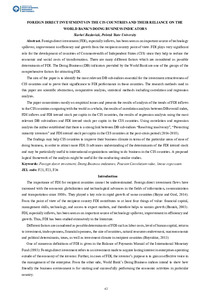Please use this identifier to cite or link to this item:
https://elib.psu.by/handle/123456789/28799| Title: | Foreign Direct Investments in the Cis Countries and their Reliance on the World Bank’s Doing Business Indicators |
| Authors: | Baslaviak, S. |
| Issue Date: | 2020 |
| Publisher: | Riga : University of Latvia |
| Citation: | Baslaviak S. Foreign direct investments in the cis countries and their reliance on the world bank’s doing business indicators / S. Baslaviak // The 12th international scientific conference "New Challenges in Economic and Business Development – 2020: Economic Inequality and Well-Being": Riga, Latvia, October 2, 2020. - Riga: University of Latvia, 2020. – P. 42-53. |
| Abstract: | Foreign direct investment (FDI), especially inflows, has been seen as an important source of technology spillover, improvement in efficiency and growth from the recipient country point of view. FDI plays very significant role for the development of countries of Commonwealth of Independent States (CIS) since they help to reduce the economic and social costs of transformation. There are many different factors which are considered as possible determinants of FDI. The Doing Business (DB) indicators provided by the World Bank are one of the groups of the comprehensive factors for attracting FDI. The aim of the paper is to identify the most relevant DB sub-indices essential for the investment attractiveness of CIS countries and to prove their significance to FDI performance in those countries. The research methods used in this paper are scientific abstraction, comparative analysis, statistical methods including correlation and regression analysis. The paper concentrates mostly on empirical issues and presents the results of analysis of the trends of FDI inflows to the CIS countries comparing with the world as a whole, the results of correlation analysis between DB overall index, FDI inflows and FDI inward stock per capita in the CIS countries, the results of regression analysis using the most relevant DB sub-indices and FDI inward stock per capita in the CIS countries. Using correlation and regression analysis the author established that there is a strong link between DB sub-indices “Resolving insolvency”, “Protecting minority investors” and FDI inward stock per capita in the CIS countries at the post-crisis period (2016-2018). The findings may help CIS countries to improve their business climate in terms of the particular areas of ease of doing business, in order to attract more FDI. It advances understanding of the determinants of the FDI inward stock and may be particularly useful to international organizations seeking to do business in the CIS countries. A proposed logical framework of the analysis might be useful for the conducting similar studies. |
| URI: | https://elib.psu.by/handle/123456789/28799 |
| Appears in Collections: | Публикации в Scopus и Web of Science |
Items in DSpace are protected by copyright, with all rights reserved, unless otherwise indicated.
